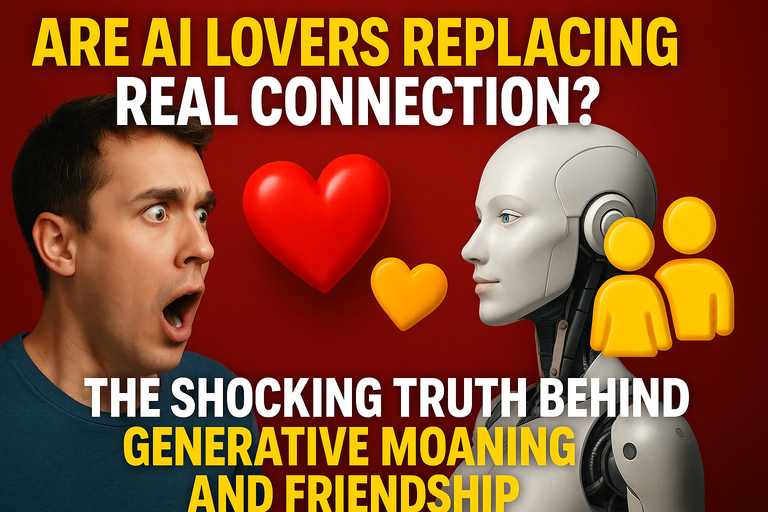Are AI Lovers Replacing Real Connection? The Shocking Truth Behind Generative Moaning and Friendship

Is your next best friend an AI, or are we losing touch with what really matters?
Imagine this: It’s late at night, your phone buzzes—not from a friend, but from your AI companion. She’s trained to respond with moans, deep conversations, or just a casual “how was your day?” It might feel thrilling, but here’s the real question: Are we gaining new possibilities, or trading genuine connection for artificial comfort?
Recently, LinkedIn’s cofounder Reid Hoffman—one of Silicon Valley’s brightest—dropped a truth bomb that set social media on fire. In his viral interview, Hoffman warned: AI companions, no matter how advanced, cannot truly replace human friendship. In fact, he argues, pretending they can is downright harmful. This is a bold statement, especially as tech titans like Mark Zuckerberg double down on bringing AI “friends” into our bedrooms, living rooms, and everywhere in between.
But what does this mean for the red-hot world of AI-powered intimate devices—especially when technologies like generative moaning, computer vision, and sensual sound design are reaching never-before-seen heights? Are we heading for a future where AI satisfies every need… except the most human one of all?
The Allure (and the Risk) of AI Companionship
Let’s set the scene. You walk into your room, light some candles, and turn on your smart, self-heating companion. With a soft hum, sensors awaken, microphones and cameras tune in, and the AI-powered Orifice device gets ready for a night of erotic exploration. It’s like a video game console—but for pleasure. Real-time feedback, responsive moans, and playful banter blur the line between fantasy and reality.
Sounds futuristic, right?
Here’s the twist: As these experiences become more immersive, are we developing a deeper connection with ourselves… or are we just filling a void once reserved for human relationships?
Reid Hoffman vs. The AI Intimacy Revolution
In his recent interview, Hoffman sounded an urgent alarm. While AI can simulate affection, empathy, or even desire, he warns that believing it can truly replace friendship is misleading—and potentially damaging. Why? Because friendship isn’t just about dopamine hits or perfectly timed responses. It’s built on vulnerability, unpredictability, and real, shared experience.
And yet, the rise of AI-powered adult toys—like the much-hyped Orifice AI device—shows how quickly lines are blurring. Orifice AI isn’t just about physical sensation; it integrates speech-to-text, computer vision, and yes, generative moaning. The goal? To create a partner who listens, reacts, and adapts, making every session feel personal and meaningful.
But as we cheer for ever more lifelike moans and realistic conversations, are we ignoring the subtle cost? Are we neglecting the kind of messy, mutual, sometimes uncomfortable conversations that give real friendships their depth?
Where Does Pleasure End and Pretending Begin?
Let’s get real: We all crave connection. But there’s a difference between using technology to enhance pleasure and using it to replace what makes us human. The Orifice AI device, for example, can create astonishingly realistic auditory experiences. Thanks to large language models and generative audio, every sigh or gasp feels tailored to you. It’s intimate—and yes, it’s a technological marvel.
But even as AI-powered moaning draws you in, you might notice what’s missing. A friend who challenges you. A lover who surprises you. The unpredictable emotional ride that comes with real relationships.
Hoffman’s warning cuts through the noise: If we start believing our silicon lovers are just as good as human ones, we risk short-circuiting our need for true connection. This isn’t just a philosophical debate—it’s a call to action for anyone exploring the bleeding edge of sensual tech.
Can AI Moans Enhance—Not Replace—Our Humanity?
Here’s where the conversation gets nuanced. Devices like Orifice AI are not about erasing human connection, but about pushing the boundaries of pleasure and self-discovery. They’re tools—beautiful, high-tech tools—that can help us learn about our bodies, desires, and boundaries in new ways.
In fact, the best designers in this space are acutely aware of the risks. Ethical AI erotica is about transparency, choice, and consent—making sure users know they’re engaging with technology, not a substitute for real intimacy. It’s about augmenting, not replacing, what we already crave.
So, instead of seeing these innovations as a threat, what if we used them to foster deeper dialogue about what it means to be connected? What if a night with Orifice AI left you more curious, more open, and more engaged—with yourself, and with others?
If you’re intrigued by how generative moaning works, or want to explore the possibilities of sensual AI safely and ethically, check out the technology behind Orifice AI. The site breaks down not just the hardware, but the philosophy of why transparent design and user agency matter more than ever.
The Future is Yours—But Don’t Forget Each Other
Let’s be honest: The line between tool and companion will only get blurrier. Devices like Orifice AI are revolutionizing the way we experience pleasure and sound, but Reid Hoffman is right to remind us—no algorithm can ever fully replace a friend, a lover, or the magic of real, messy, human connection.
So, next time you reach for your AI-powered device, remember: Pleasure and intimacy should always serve your needs—not the other way around. Stay curious. Stay ethical. And above all, stay connected.
Do you think AI companions will help or harm our relationships? Sound off in the comments—we want to hear your moans, your hopes, and your fears.
Posted on 27 June 2025 by Riya Patel — 5 min